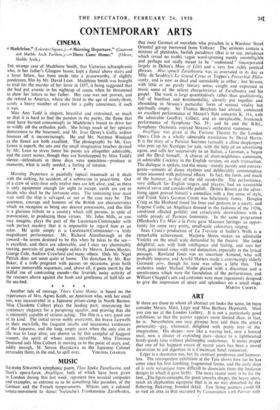CONTEMPORARY ARTS
CINEMA
"Madeleine." (Leicester Square.)—“Morning Departure." (Gaumont and Marble Arch Pavilion.)—“ Three Came Home." (Odeon, Marble Arch.) THE strange case of Madeleine Smith, that Victorian schizophrenic who, in her father's Glasgow house, kept a fiance above stairs and a lover below, has been made into a praiseworthy, if slightly ponderous, film by Mr. David Lean. Madeleine Smith was brought to trial for the murder of her lover in 1857, it being suggested that she had put arsenic in his nightcap of cocoa when he threatened to show her letters to her father. Her case was not proven, and she retired to America, where she lived to the age of ninety-three, surely a heavy number of years for a guilty conscience, if such it was.
Miss Ann Todd is elegant, beautiful and restrained, so much so that it is hard to find the passion in the purity, the flame that must have burned consumingly in Madeleine's breast to drive her so wildly off the orthodox path. She brings much of her upstairs demureness to the basement, and Mr. Ivan Desny's Gallic ardour bounces off it unconvincingly. He and Mr. Norman Wooland as the fiancé are both excellent. The photography by Mr. Guy Green is superb, the sets and the small imaginative touches devised by Mr. Lean to stress home his points are altogether admirable, and the court scenes, though they are handicapped by Miss Todd's silence—defendants in those days were speechless—produce at moments, what is sadly needed, a feeling of tension. * * * * Morning Departure is painfully topical inasmuch as it deals with the sinking, by accident, of a submarine in peace-time. Out of a crew of sixty-four only twelve men are left alive, and, as there is only equipment enough for eight to escape, cards are cut to decide who shall be the fortunate ones. The remaining four must wait until the ship is salvaged, or not as the case may be. The quietness, courage and humour of the British are characteristics which we recognise as being our dearest possessions, and this film is a glorious tribute to a country which still persists, in spite of provocation, in producing these virtues. Mr. John Mills, as you may imagine, plays the part of the Lieutenant-Commander with such perfect mastery that it is impossible to regard him as an actor. He quite simply is a Lieutenant-Commander—a truly magnificent performance. Mr. Richard Attenborough as the coward—he seems destined to be this when he takes to the sea— is excellent, and there are admirable, and I may say abominably moving, portraits of good, simple sailors by Messrs. James Hayter, George Cole, Andrew Crawford and many others. Only Mr. Nigel Patrick does not seem quite at home. The direction by Mr. Roy Baker, if a trifle pregnant with pauses on occasions, gives birth to some memorable sequences, and, above all, it gains merit by the skilful use of contrasting moods—the feverish, noisy activity of the rescuers above against the hush and gentleness of half-life on the sea-bed. * * * * Another tale of courage, Three Came Home, is based on the experiences of Mrs. Agnes Keith, an American who, with her small son, was incarcerated in a Japanese prison-camp in North Borneo. Miss Claudette Colbert plays the leading part, renouncing her customary elegance for a perspiring squalor, and proving that she is eminently capable of serious acting. The film is a very good one of its kind. The initial terror nobly overcome, the brave farewells to their men-folk, the frequent insults and 'occasional kindnesses of the Japanese, and the long, empty years when the only aim in life was to keep alive, are shown us by this campful of haggard women, the spirit of whom seems incredible. Miss Florence Desmond aids Miss Colbert in moving us to the point of tears, and, oddly enough, M. Sessua Hayakawa as the Japanese Colonel
persuades them, in the end, to spill over. VIRGINIA GRAHAM.


































 Previous page
Previous page